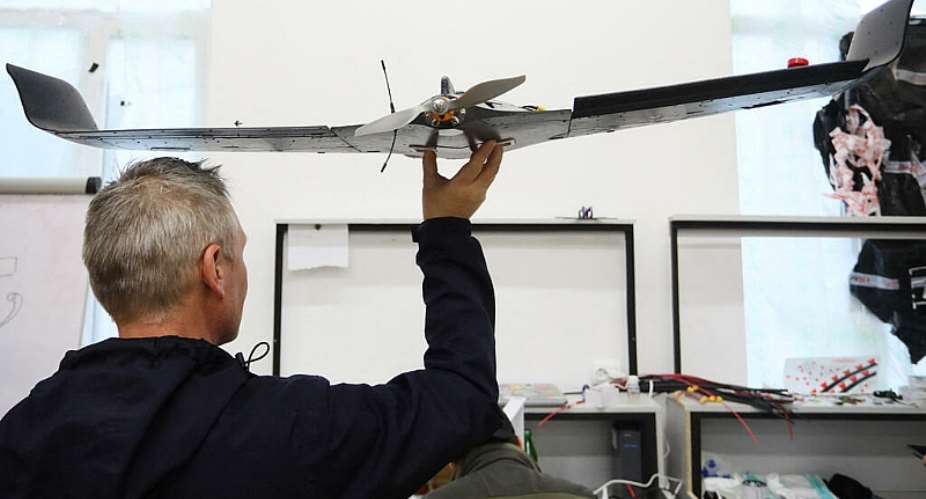Turkish-made drones have featured prominently in Ukraine's resistance against Russia's invasion, taking out significant Russian targets in the first few weeks of the war. But the conflict, and any possibility of a Russian victory, have cast a shadow over the future of Turkey's rapidly growing drone industry, which relies on Ukrainian engines.
A Ukrainian controller carefully aims at a video screen of a Russian tank and then unleashes a missile from a Turkish-made Bayraktar drone, destroying the target to cheers by the operators.
The Ukrainians widely distribute videos like these. Both militarily and psychologically, the drones have given much-needed hope to the Ukrainians and struck fear in their Russian adversaries.
The conflict is the latest in a series of military successes for Turkey's TB2 Bayraktar drones. But their future could be in doubt if Russia was to prevail over Ukraine, given the drone's dependence on Ukrainian engines and Moscow's growing concerns over their success.
Competitive
"Russia sees Bayraktar's TB2's in particular as a highly competitive weapon and technology not just in the former Soviet space but in the global aerial vehicle market," points out analyst Samuel Bendett of the Russian studies Department at the US-based Centre for Naval Analyses.
"Russians are nervous that Bayraktar is penetrating the former Soviet space, the Caucasus and Central Asia, and now Ukraine.
"And so, if Russians were to sort of exercise the full extent of their powers in the outcome of the (peace) negotiations, they would probably seek to limit Ukrainian military cooperation with Turkey so as not to further growing Turkish advantage in certain technologies like UAVs."
Turkish Bayraktar drone promotional videos highlight their recent military success from Azerbaijan to Syria and across Africa. The drone's success, coupled with competitive pricing, has become a formidable commercial force in the fiercely competitive arms world.
"The advantage of the TB2 is that it's a one-stop-shop. You get the drone, you get the training and the munitions come with it," said Aaron Stein, director of research at the Foreign Policy Research Institute.
"And the overall price tag, I think the consensus is around five million dollars, and I think that it's all-in including the munitions, And so for less well-to-do countries, it's a bargain."
Few controls
But that's not all, as Turkey attaches few controls on how the drones are used, unlike their western counterparts. As a result, Turkish drones have been used in conflicts such as the Ethiopian civil war, drawing international criticism from rights groups.
Such sales are only possible because Ukrainian engines allow Turkish companies to circumvent restrictions on third-party use from their traditional western suppliers.
"Turkey has been facing big problems in procuring subsystems, technologies, and components from western countries," said Turkish defence expert Arda Mevlutoglu.
"Whereas Ukraine is offering reliable and relatively low-cost technologies without major political strings attached. Ukraine has become a major power plant supplier not only for drones but for helicopters as well."
If Turkish drone manufacturers are forced to turn back to their traditional western suppliers, they are predicted to face significant problems – especially when it comes to drone technology.
"There are more restrictions when you deal with the UK, European or American suppliers, and that is something Turkey will definitely keep in mind," warns James Rogers, assistant professor in war studies at the University of Southern Denmark.
"We know that the United States has been very selective as to who it sells drones and drone elements to around the world.
"This was one of the reasons why Turkey started its entire indigenous drone program because Congress wouldn't approve the sale of Reaper-Predator generation medium-altitude, long-endurance drones to Turkey."
Failures
Earlier this year, a prominent Turkish military helicopter deal with Pakistan collapsed over Washington's restrictions on the use of American engines.
In addition, Congress has been enforcing increased controls on the supplies of military components to Turkey over Ankara's purchase of Russia's S400-made missile defence system.
Despite Ankara receiving praise from Washington over its support of Ukraine, analyst Stein expects little change in Washington's stance towards Turkey.
"One side is that Turkey is hostile to the United States. It's no longer an ally; it's an adversary. So, we should be treating it as such," says Stein.
"The other side is we misunderstand Turkey, and it needs a big hug because it's so important. And the government is somewhere in the middle, and usually, current events reinforce positions on either side."
Given the challenges of finding an alternative to Ukrainian engines, Turkey's drone industry will likely look for drones to thwart Moscow's ambitions and secure Kyiv and its future.





 Dr. Wiafe Akenteng: Over 3,000 cured of kidney disease by award-winning Ghanaian...
Dr. Wiafe Akenteng: Over 3,000 cured of kidney disease by award-winning Ghanaian...
 Do I have to apologise for doing my security work? I won’t – Simon Osei-Mensah t...
Do I have to apologise for doing my security work? I won’t – Simon Osei-Mensah t...
 Railway Minister Peter Amewu loses 94-year-old mother
Railway Minister Peter Amewu loses 94-year-old mother
 Prestea and Bogoso mines: Complete payment of outstanding salaries not later tha...
Prestea and Bogoso mines: Complete payment of outstanding salaries not later tha...
 NDC postpones Prof. Opoku-Agyemang entry tour to May
NDC postpones Prof. Opoku-Agyemang entry tour to May
 All my businesses have collapsed under Akufo-Addo — NDC Central regional chair
All my businesses have collapsed under Akufo-Addo — NDC Central regional chair
 Military, Prison Officers clash in Bawku, three injured
Military, Prison Officers clash in Bawku, three injured
 GRA-SML contract: MFWA files RTI request demanding KPMG report
GRA-SML contract: MFWA files RTI request demanding KPMG report
 Court threatens to call second accused to testify if NDC's Ofosu Ampofo fails to...
Court threatens to call second accused to testify if NDC's Ofosu Ampofo fails to...
 Family accuses hospital of medical negligence, extortion in death of 17-year-old...
Family accuses hospital of medical negligence, extortion in death of 17-year-old...
